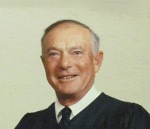When Judge Peter Beer passed away on February 9, 2018, just 2 months and 3 days shy of his 90th birthday, we lost not only a wonderful federal jurist of 30 years, but also a man who was a: veteran of two wars and bronze star recipient; former New Orleans City Councilman; state appellate judge; avid sailor and golfer; and perhaps most important to him, a father of three.
Those who knew Judge Beer well best described him as follows: self-deprecating; sense of fairness; common sensical; dutiful; and love of country. When he would enter his courtroom, Judge Beer would say: “Please keep your seats, folks.” And when attorneys had completed their arguments on rule day, Judge Beer would always thank them for “all their good work.” Judge Beer was a person who was respected by both his colleagues on the bench and also the lawyers and litigants who appeared in his courtroom.
Judge Beer graduated early, at age 17, from Isidore Newman School in New Orleans and immediately volunteered for the Army during what would be the closing months of World War II. He was in boot camp in Texas when the war ended. His son, Kenneth Beer, liked to say that “Hitler and the Japanese heard that Pete was coming, so they knew to surrender!”
After graduating from Tulane Law School, Judge Beer joined the Air Force and served during the Korean conflict, later receiving the Bronze Star for his meritorious service during combat. He was called up again during the Cuban missile crisis, eventually attaining the rank of lieutenant colonel.
Judge Beer joined the New Orleans firm of Montgomery, Barnett, Brown and Sessions in 1954 as an associate. He became a partner and remained with the firm for 20 years, serving as the firm’s managing partner.
In 1970, Judge Beer was elected Councilman for District A in New Orleans. At that time, District A encompassed a large swath of the City to include the westbank, French Quarter and parts of uptown New Orleans. Judge Beer recognized the wide diversity of his constituents and for four years, worked hard to find common ground to represent everyone fairly.
Judge Beer felt a calling to the bench and was elected to the Louisiana Fourth Circuit Court of Appeal, on which he served for 5 years before being appointed as an independent to the United States District Court for the Eastern District by President Jimmy Carter.
A colleague and former Chief Judge of the Eastern District, Judge A.J. McNamara described Judge Beer as follows: “Pete has the ability to laugh at himself. But he is possessed with an ideal judicial temperament, that rare blend of firm control in the courtroom while not being overbearing.
Another colleague of his, Judge Adrian Duplantier, said this about Judge Beer: “He displays sound judgment, empathy to those less fortunate, and most of all a sense that he is first and foremost a servant of his beloved nation. As a result of a lifetime of public service, Peter Beer has been a consummate federal trial judge.”
Judge Eldon Fallon, who has known Judge Beer since the former was an associate and Judge Beer was lead trial attorney at Montgomery Barnett, recalled a trial the two had against one another in the 1960s. “Judge Beer won most of his trials. He won a trial against me, and as was his practice, the first person at the table after he had won was Peter. He said to me: ‘Pal, you did a good job.’ I don’t recall the facts of the case, but I remembered Pete trying to make me feel better about the loss.”
Judge Fallon said “Judge Beer had a way of adding dignity with informality, which was a hard task to perform.” Judge Beer was known for saying: “Good morning gents, pull up a chair.”
On one occasion, it was a hot day in New Orleans, and Judge Beer was presiding over a trial. The air conditioning in the courthouse was not working, so Judge Beer told the attorneys and litigants that they could take their coats and ties off. Judge Beer even took his robe and tie off. During the admiralty trial, a witness/seaman was asked by Judge Beer to give his name and address. The seaman looked at Judge Beer with no robe, no tie and wearing topsiders with no socks, and he said: “I think I will wait for the judge to come out.”
During his confirmation hearing before the US Senate, Judge Beer was asked by Sen. Patrick Leahy (D-VT) to comment about the influence a judge’s background and temperament may affect his or her rulings. Judge Beer answered: “I think that we are constantly charged with the responsibility of trying to be evenhanded in the administration of justice, regardless of those persuasions.”
His philosophy as a judge was reflected in his rulings. In one such case which paints a vivid portrait of the man and judge whom he was, Succession of Fusilier ( La App Ct 1975), the court held that the illegitimate daughter was entitled to receive the property of her father under his will. In a footnote to his opinion, Judge Beer wrote: “I believe that Article 1843 of the Louisiana Civil Code, [which prevented an illegitimate daughter the ability to inherit her father’s property], is violative of the equal protection clause of the Constitution. I believe that our Civil Code must be interpreted in the bright reflected light of the Constitution, and I believe that the Constitutional safeguard of equal protection connotes an ever changing, always vibrant quest for fairness and impartiality in the administration of justice.” Judge Beer was right as Louisiana Legislature declared Article 1843 unconstitutional and repealed it four years later.

